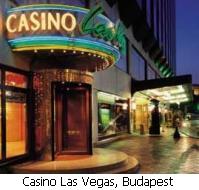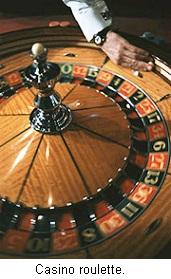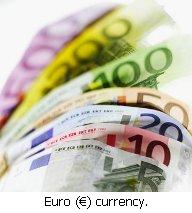| Global guide and useful general information related to land-based casinos:
Topics: The origin of casinos - The 'House Edge' - Admittance ID - Games categories - Roulette types - The 'La Boule' mini-roulette - Banca Francesa dice game - Trente et Quarante card game - Tipping - Gaming currency - Euro countries - Money limit in/out of the EU - EU Member States - Did you know? The origin of casinos
When several European countries legalized table gaming around 1930, many new casinos were established. However, the social and legal status of casinos varied from country to country, based on the gaming laws at the time. Some countries opted for a system of nationalized casinos, while others created a more open and competitive gaming market by licensing private operators. Starting with smaller casinos that mostly catered to the local market, there gradually emerged casinos with large premises with a particular appeal to tourists. The House Edge The House Edge (the casino odds advantage) is a universally accepted feature of International casino gaming and, on average, the House Edge applied in UK casinos is one of the lowest compared to many other countries. Casino games, such as Roulette, Blackjack, Baccarat etc, are banker's games and, as such, are games of 'unequal chance'. The nature and structure of these games therefore gives an advantage to the House (the casino). This is called the 'House Edge'. The House Edge gives a measure of the percentage that a casino would expect to retain, on average, from each played hand or spin, given normal patterns of play. In very simple terms, the House Edge works in two ways:
Admittance ID - Identification requirement for admittance A Passport or a form of identification is required in most land casinos with live table games and in most countries. In some countries the casinos do not accept a driving licence as a form of identification (example: Luxembourg). In Bulgaria and Poland you are required by law to bring your Passport or ID every time you visit a casino with live table games, even though you become a registered member of the casino and carry a membership card. By contrast, in Lithuania you do not have to show your passport or need to register when you enter a casino with and without live table games. Where a form of identification is not a requirement, it is still advisable to have it, as there may be instances where they may need to ask for identification, such as if you look younger than the minimum gaming age allowed. Also, if you gamble with lots of money they may ask that you produce a form of identification or if you win a large sum of money they may ask you for identification at the casino cash desk before paying you. Games categories There are two distinctive types of casino games:
Roulette types - And how the casinos in certain countries call them
With the American Roulette the dealer spins the wheel and handles the chips (the buy-ins and the payouts), and the game is played at a faster pace than the French Roulette. Also, colour chips are used to distinguish the players and a 'dolly' to mark the winning number. American Roulette can have a single zero (0) or a double zero (0, 00). The manner it is played is the same for both. The major difference between the two, besides the zero positions, is the sequence of the numbers on the roulette wheel; they are totally different. The Americans call the single-zero version "European Roulette". The French call it "English Roulette". The English call it "American Roulette". In European casinos they call it "Fair Roulette" or "American Roulette". In some African countries they call it "Roulette with French numeration on American table". French Roulette is known everywhere as French Roulette, has a single zero, a wide table layout and have 'stickmen' that handle the chips (cash chips are used) and use the end of the stick to point out the winning number. The French Roulette uses the same type of roulette wheel with the same sequence of numbers as the single-zero American Roulette. Boule - The mini roulette Boule or La Boule is a simple and fast game that is similar to Roulette, popular in French casinos The game features a table and a wheel with only 9 numbers and 3 different colours. The wheel is spun and a small rubber ball bounces around the wheel before settling into one of the coloured holes to determine the outcome. Banca Francesa - A popular Portuguese dice game Banca Francesa or French Bank is a dice game common in Portuguese casinos. The game is played with three dice on a large table. In a way it is similar to the card game Punto Banco (Baccarat). Players can bet on "Big" or "Small" being the total points of the three dice (14, 15 or 16 points is Big; 5, 6 or 7 points is Small) or "Aces" (one dot per dice, total 3 points). The dealer will be re-rolling the dice until one of these results shows up. Big and Small both pay even money while Aces pays 61 to 1. The house edge (casino advantage) on all three bets is approximately 1.6%. Trente et Quarante - (Thirty and Forty) card game Also called Rouge et Noir (Red and Black), is a game of French origin found in Casino Monte-Carlo and in French and Italian casinos played with cards and a special table. The game has many similarities to Punto Banco (Baccarat). The name Trente et Quarante is derived from the fact that the winning point lies between thirty and forty. There are five possible outcomes: Rouge or Noir, known as the "Grand Tableau", Couleur or Inverse, known as the "Petit Tableau", and a Refait (a tie). The croupier deals out two rows of cards (on the red and black positions or rouge et noir) sequentially until their total sum equals 31 or greater. Cards are counted face value and face cards count 10, aces count 1. The total closest to 31 wins. Players may bet on either 'colour row' to win. They may also bet on "Coleur" or "Inverse". Coleur is a bet on whether the first card of the winning row is the same as the colour as its row. Inverse is a bet that the first card of the winning row is not the same colour as its row. The house derives its edge (approx. 1%) in the event of a tie at 31, when the house takes one half of all the stakes. There is also an insurance bet option against the 'tie' outcome. Tipping - Casino dealers and casino personnel In most land-based casinos in European countries (Western and Eastern Europe), you tip the dealer if you win (example: you give 1 casino chip tip if you win 35 chips on a straight up bet at roulette). Normally this is not compulsory but they expect you to tip them when you win and, in some casinos, the dealer (or supervisor) will give you a hint to do so as he hands you the casino chips you just won. In the UK until recently gaming staff were not allowed to accept tips. From August 2008 tipping of all employees is permitted in Grosvenor casinos. [Aug 2008 'Tipping' update] Gaming currency The gaming currency used in casinos is usually the local one but in some European countries which are in the process of joining the Euro currency, the casinos with live table games may be using the Euro; either exclusively or in addition to the local currency. Casinos in some countries may use one of the major currencies (US Dollar, British Pound or Euro) instead of their local one. Casinos with live table games usually will accept all major credit cards, travellers checks, and will exchange major foreign currencies at a favourable exchange rate, and will exchange it back at the same rate when you leave.
On January 1, 2009 Slovakia became the 16th EU member country — and the first former Soviet bloc nation — to join the eurozone. January 1, 2009 also marks 10 years since the euro, was introduced. The symbol for euro is € and the ISO currency code is EUR. The euro is divided into 100 cents. The Eurozone (or Euro Zone - officially Euro Area and informally Euroland) has 16 members' countries with a total of 325 million inhabitants. The sixteen countries that adopted the euro are: Belgium, Germany, Ireland, Spain, France, Italy, Luxembourg, the Netherlands, Austria, Portugal, Finland (in 1999), Greece (2001), Slovenia (2007), Cyprus, Malta (2008), Slovakia (2009). The Euro is also the currency of Monaco (MC, MCO), San Marino (SM, SMR), Vatican City (VA, VAT), French Guiana (GF, GUF), Guadeloupe (GP, GLP), Martinique (MQ, MTQ), and Reunion (RE, REU). The euro is not the legal currency of all EU Member States. Two countries (Denmark and the United Kingdom) agreed to opt-out, while the remainder have yet to meet the conditions for adopting the single currency. The euro circulates widely beyond the Eurozone and beyond Europe. There are now more Euros in circulation worldwide than US Dollars. The euro has also started to serve as a reserve currency, second to the US Dollar. A 'reserve currency' is a currency which is held in significant quantities by central banks and other major financial institutions in many countries as part of their foreign exchange reserves and tends to be an international pricing currency for products traded on a global market, such as oil and gold. [Jan 2009 'Euro countries' update] Money limit entering the EU Since 15 June 2007 new legislation on the controls of cash entering or leaving the EU apply in all Member States (this may not apply to Denmark and UK who opted out of the Euro currency). Any person entering or leaving the EU will have to declare the cash that they are carrying if this amounts to 10,000 euros or more; this includes cheques, travellers' cheques, money orders, etc. This will not apply to anyone travelling via the EU to a non-EU country, as long as the original journey started outside of the EU nor to those travelling within the EU. [June 2008 'Money limit' update] The Member States of the EU 27 Member States of the European Union (EU): Belgium, Germany, France, Italy, Luxembourg, Netherlands (the 6 founding members), Denmark, Ireland, United Kingdom (joined in 1973), Greece (1981), Portugal, Spain (1986), Austria, Finland, Sweden (1995), Czech Republic, Estonia, Cyprus, Latvia, Lithuania, Hungary, Malta, Poland, Slovenia, Slovakia (2004), Bulgaria, Romania (2007). [Jun 2008 'Member States' update] Did you know?
[Nov 2008 last update] Related links Macau casino guide - Asia, Macau gaming rules and regulations. UK casino guide - UK gaming rules and regulations on land-based casinos. UK cardroom guide - UK gaming rules and regulations on land-based card rooms. USA casino guides - United States gaming rules and regulations, states index page. Land casino reviews - Reviews of world land-based casinos. Travel tips - Security, comfort and money savers. |
Advice Resources * Extras Facilities Home ¬ Start here! All about... |

 Gambling casinos originated in Europe. There have been casinos in Europe for over two hundred years. The first were found in the expensive French resorts and German spas. With the introduction of roulette in the late eighteenth century, the casinos began to draw a much wider public.
Gambling casinos originated in Europe. There have been casinos in Europe for over two hundred years. The first were found in the expensive French resorts and German spas. With the introduction of roulette in the late eighteenth century, the casinos began to draw a much wider public.
 There are two distinctive types of roulette table games: the American Roulette and the French Roulette.
There are two distinctive types of roulette table games: the American Roulette and the French Roulette.
 Euro countries (countries using the Euro currency)
Euro countries (countries using the Euro currency)





